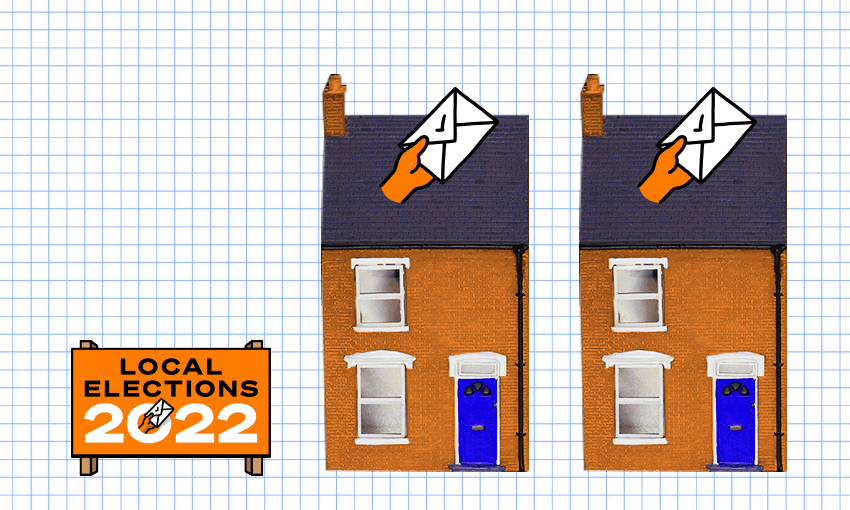A petition from Renters United calls for the removal of the ratepayer roll, which allows people to vote in local elections at home – and wherever they own property.
Advocacy group Renters United has today launched a petition calling for an amendment to the Local Government Act 2001 to end the “ratepayer franchise”. The ratepayer roll is an alternative electoral roll that allows ratepayers who own property in local government jurisdictions where they aren’t residents to vote both in an area where they reside and in other council or community/local board areas where they own property.
“The Ratepayer Elector Roll is inherently undemocratic, violating the principle of one person one vote to such an extent that in 2016 one man was eligible to vote in seven different elections,” reads the petition.
“We did away with property-based voting in national elections in 1881, and now it’s time for local government elections to catch up,” said Éimhín O’Shea, a spokesperson for Renters United.
The Renters United petition may be welcomed by some members of parliament; in a One News segment last month, several MPs expressed ignorance of the ratepayer electoral roll, while others said they would be interested in examining the law further.
The number of ratepayer electors is small, with many people who would be eligible not registering for their extra votes. In the 2019 local elections there were 1,311 and 1,076 registered ratepayer electors in Kāpiti and Coromandel respectively, the two districts with the highest number of non-resident ratepayer voters.
However, O’Shea points out that low turnout in local elections means that these small numbers can have a big impact. In the 2019 election, for example, Wellington’s Andy Foster was voted in as mayor with a tiny margin of 62 votes under the STV system. 219 ratepayer electors were registered in that election; their involvement may have decided the vote.
To Renters United, this system is unfair. “The message it sends to voters is that if you’re wealthy, your vote matters more,” said O’Shea. “The ratepayer roll will incentivise candidates for local government to unfairly prioritise property owners over those with low income and renters.”
‘Skin in the game’
Gary Gotlieb, an elected member for Coromandel-Thames District Council defended the status quo. He told The Spinoff that non-resident ratepayers deserve to choose who gathers their rates and how they are spent. “If you pay rates you have skin in the game and you’re entitled to a say in who governs you,” said Gotlieb, an Auckland resident who has owned property in the Coromandel for decades. He has a vested interest, he said, as a member of the community. He has been encouraging people he knows to register with the ratepayers roll to make their voice heard.
Reuben van Dorfen, a real estate agent based in Whangamata also running for Thames-Coromandel District Council, agreed. It makes sense, he said, that ratepayers should have a voice, although he has sympathy for the “one person gets one vote” concept. “Ratepayers are contributing to the community – the thing with Coromandel is that people who own beach houses sustain the economy and way of life here.”
Other elected members, however, disagree that the ratepayer roll is necessary. “In reflecting on who local government exists to serve and what it exists to service, I don’t think this separate roll has a place,” said Sophie Handford, a Kāpiti District Councillor running again in the 2022 elections. “Equal voting rights are the key foundation to a healthy democracy.”
Renters United’s O’Shea said they are launching their petition to remove what they see as an archaic inequity from Aotearoa’s electoral law. “Absent ratepayers don’t need their rubbish picked up, they don’t need green spaces, they don’t need public transport options. There’s a disconnect between that and the ratepayer roll existing.”
In response to concerns like these, Gotlieb said that in places like Coromandel where non-resident ratepayers like himself are a majority, the roll makes sure the contribution of ratepayers can shape the council. As it is, he said, the fact that council positions are determined by permanent population means non-resident ratepayers aren’t equally represented. The south east ward where Gotlieb is running, which includes the beach town of Whangamatā, pays 39.5% of the total rates for the district, but only has two councillors as most of the population isn’t permanent; the town of Thames, where 73% of the ratepayers are permanent, pays 19.4% of total rates and gets three councillors.
Gotlieb sees his role on council as an opportunity to give non-resident ratepayers, as a part of the community and economy, the space to have their say. It comes at a cost to him personally, he said. “It’s a bloody pain with the travel [from Auckland to Coromandel]; I might travel for four hours to get to a meeting that is just an hour and a half.” Often, his wife drives him so he can rest. “If others are jealous of [of ratepayers getting two votes] then I’m sorry, that’s life!”
O’Shea emphasises that for ratepayers seeking to be involved in the communities where they own properties, there are many options to make their voice heard in local government beyond voting. “Landlords and absentee ratepayers can advocate for themselves through making submissions to council and LGOIMAs [official information requests],” he said.
“No-one is telling you you have to have a holiday home – there are costs associated with that,” he said, noting that businesses and individuals who own multiple properties don’t expect to get extra electorate votes in national elections.
Renters already face barriers in local elections, with postal voting making it more difficult for those who move frequently to be registered with the right address. “When we have turnout as low as we do in local elections, we need to examine every barrier to voting and do everything we can to mitigate it,” said O’Shea.
“Local elections are a chance for everyone in New Zealand to have a say in what they want their community to look like,” said O’Shea. He encouraged interested parties to sign the Renters United petition. “Local bodies exist to provide services to their residents, not their ratepayers.”
Follow our politics podcast Gone By Lunchtime on Apple Podcasts, Spotify or your favourite podcast provider.

